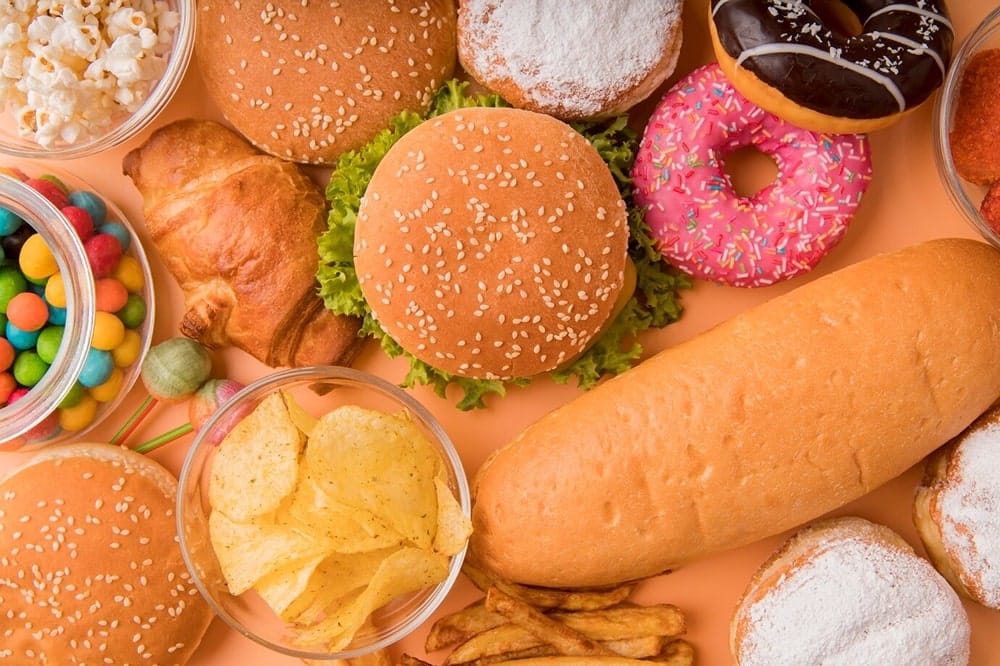No products in the cart.
Health Guides
Weight Management
How To Stop Binge Eating?

Ever tried to eat just one potato chip and ended up finishing the whole pack of chips? It may feel impossible to just have a bite of something without finishing the whole thing. A little nibble triggers the urge to eat more which then later leaves us feeling guilty. Some people would even feel driven to keep eating to the point where the food’s no longer enjoyable. We all know that binge eating can result in weight gain and is damaging to our health, but sometimes we will feel out of control. If you tend to feel out of control around food, here are some tips on how you can break the cycle and get back to a healthier relationship with food.

Unhealthy Comfort Food that is Commonly Associated with Overeating and Emotional Eating
- Identify Your Triggers
The first step in stopping overeating is figuring out why you’re doing it in the first place. Often, binge eating isn’t about the food at all. It could be stress, boredom, anxiety, or even just a habit you’ve developed over years. Take a moment to ask yourself: What sets me off? Is it a certain time of day? Maybe you’re feeling overwhelmed at work or dealing with relationship drama. What happened to you a day or even a week before it happened? Or maybe you’re just really hungry after skipping a meal in the morning? Give yourself some time to think over what happened before you start binge eating. Once you pinpoint your triggers, you can manage them better in the future. For example, if stress is a trigger, try practicing relaxation techniques like deep breathing or journaling when you feel the urge to binge.
If you’re unsure whether you’re actually hungry or just reaching for food out of habit, try asking yourself this: If a balanced meal (eg. chicken rice with bean sprouts) were the only option right now, would you still choose to eat it? If the answer is yes, it could be a sign that you’re not eating enough earlier in the day. But if the answer is no, it’s more likely you’re eating out of habit or boredom, not true hunger. - Eat Balanced Meals
One of the most effective ways to prevent binge eating is to make sure you’re nourishing your body properly throughout the day. Make sure you’re not skipping your meals and most importantly, make sure your meals are balanced. When your meals are unbalanced—for example, plain white bread with mostly carbs without adding extra eggs or milk for your protein and fats—your blood sugar levels can spike and then crash drastically, leaving you feeling hungrier and more likely to crave unhealthy foods later.
Aim to eat well-rounded meals that include a mix of protein, fiber, healthy fats, and carbs. For example, rice with stir fried veggies and grilled chicken. Having a little bit of everything will help prevent the cravings that often lead to binge eating. - Practice Mindful Eating
We’re all guilty of doing this, snacking in front of the TV, snacking while we are on the phone, chugging down our lunch while rushing through our work project, or mindlessly grabbing whatever’s in the fridge. When we’re on “autopilot” mode, it’s so easy to overeat because we’re not tuned in to what our body is actually telling us about hunger or fullness.
Mindful eating is all about slowing down and tuning into your senses. [1] Pay attention to how the food looks, notice the color, the smell, how it tastes like. Chew slowly, enjoy each bite, and notice how your body feels. You’ll start to recognize when you’re actually full, and when that satisfying feeling kicks in, you’ll be more likely to stop eating. - Move Your Body
Exercise isn’t just great for your body—it’s a powerful boost for your mind too. Many of us follow a structured routine of going to work, coming home, settling the kids, and unwinding with our phones or TV for some much-needed “me time.” While comforting, this routine can start to feel monotonous, leaving us craving something more exciting to break the cycle. Often, this leads to turning to food as a source of comfort. [2]
Induging in regular physical activity can help reduce stress, boost your mood, and curb cravings. You don’t have to hit the gym for hours to see benefits. Whether it’s a walk around the block, a short yoga session, or dancing to your favorite tunes, find an activity you genuinely enjoy and make it a regular part of your routine. Not only will this improve your mental and emotional well-being, but it can also serve as a healthy distraction. When you’re engaged in something you love, you’re less likely to rely on food for comfort and more likely to build a sustainable, uplifting habit. - Curb Cravings Naturally
Cravings can feel intense, especially when they hit out of nowhere. But instead of reaching for sugary snacks or chips, there are some natural ways to curb those cravings without going overboard.- Drink water: Sometimes we may mistake thirst as hunger. So try sipping on a glass of water when you feel a craving coming on and see if it helps.
- Eat more fiber and proteins: Proteins and high-fiber foods like fruits, vegetables, and whole grains keep you fuller longer, which can reduce the likelihood of cravings. [3,4]
- Get enough sleep: Lack of sleep messes with your hunger hormones [5], making you crave more junk. Prioritize a good night’s rest, and you’ll find it easier to resist those late-night cravings.
Wrapping It Up
By understanding your triggers, eating balanced meals, practicing mindful eating, and staying active, you can gain better control over your relationship with food. It’s all about making small, sustainable changes that build up over time.

C-Lites: Weight Loss Supplement with Natural Appetite-Suppressing Ingredients
If you’re on a weight loss journey and struggling to manage cravings, consider trying C-Lites—a comprehensive weight loss supplement designed to help curb cravings and boost fat metabolism. It contains African Wild Mango, Hoodia, and Garcinia Cambogia to suppress appetite, along with konjac and inulin to promote a feeling of fullness. This perfect blend of ingredients can be especially helpful if overeating is a challenge, giving you that extra support to stay on track.
If you’re ready to take the next step, click here to learn how C-Lites can help you in your weight loss journey: https://puremed.com.my/product/c-lites/
Reference:
- Baer, M., & Riegler, M. (2023). Mindful eating: A way to improve disordered eating and intuitive eating skills. Journal of Eating Disorders, 11(2), 1-12. https://pubmed.ncbi.nlm.nih.gov/38542795/#:~:text=%22Mindful%20eating%22%20(ME),episodes%20and%20intuitive%20eating%20training.
- Van Strien, T. (2018). Causes of emotional eating and matched treatment of obesity. Journal of Eating Disorders, 6(1), 1-12. https://journals.sagepub.com/doi/10.1177/21677026221144255
- Li, X., & Zhang, Y. (2008). Dietary patterns and their association with risk factors for cardiovascular disease. American Journal of Clinical Nutrition, 87(4), 828-834. https://pubmed.ncbi.nlm.nih.gov/18469287/
- Slavin, J. L. (2009). Dietary fiber and satiety. Nutrition Research Reviews, 22(1), 10-21. https://www.researchgate.net/publication/229893418_Dietary_fibre_and_satiety
- Cornier, M.-A., & Coles, L. (2008). The role of dietary fat in regulating appetite and energy balance. Obesity Reviews, 9(3), 373-382. https://pubmed.ncbi.nlm.nih.gov/18564298/
Recommended Articles
Join Our Newsletter
Sign up now to receive the latest news and promotions.
Shop
Learn
Support
KKLIU: 2136/2022 © 2023 PureMed. All rights reserved.

